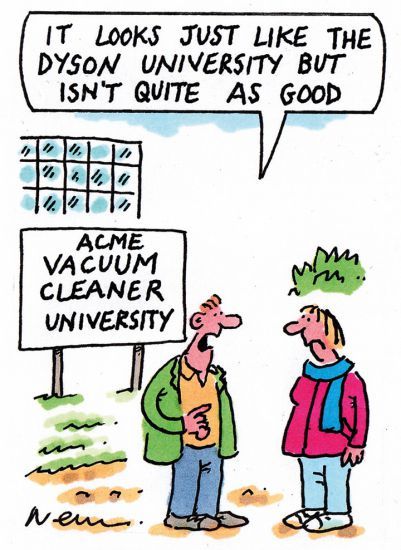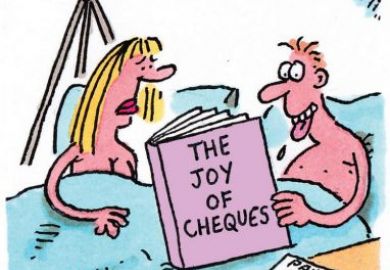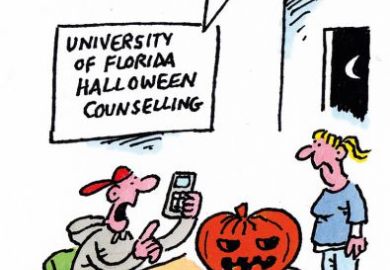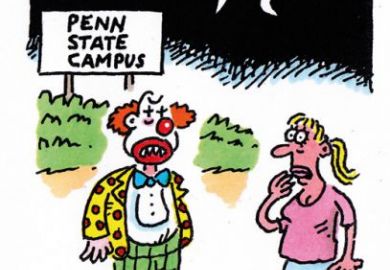
Having memorably compared universities to the burger chain McDonald’s last year, Jo Johnson, the universities minister, has another unflattering simile for higher education. Writing in The Times on 4 November, Mr Johnson said that forthcoming legislation will “strip existing universities of the power to act like bouncers, deciding who should and should not be let into the club”. His analogy to describe how universities validate degrees offered by new providers came as it was revealed that vacuum cleaner innovator Sir James Dyson was to open the UK’s first new greenfield university since the 1970s at a cost of £15 million. The Dyson university, which will take just 25 undergraduates in its first year, is a partnership with the University of Warwick, which perhaps shows that even elite universities are not unwelcoming doormen eager to slam the door in the face of plucky new entrants to the sector. And while bouncers are not always that popular with clubbers, Mr Johnson will doubtless acknowledge they often do an important job of keeping suspicious characters out.
A university-led hunt for the mythical monster Bigfoot has been condemned as “not appropriate” by its displeased president, Fox News reported on 3 November. The unusual expedition followed a two-day event at the University of New Mexico to discuss the little-seen giant Sasquatch creature, Fox News said. “I’d have to say it was pretty much a blown waste of money because we did not find evidence because of the snow,” explained Christopher Dyer, executive director at the university’s Gallup campus, who organised the conference and the subsequent ramble in New Mexico’s mountains at a cost of $7,000 (£5,630). “It was just impossible to get around out there. So in that case, yeah would we spend money on that again? Absolutely not,” added Dr Dyer. New Mexico’s president, Robert Frank, seemed less than impressed by the search for Bigfoot. “Dr Dyer needs to be much more thoughtful about how he undertakes these activities,” he said.
Another week, another furore over “political” symbols on the kit worn by sports teams. After prime minister Theresa May criticised the Fifa ban on England footballers wearing poppies, a lesser-known sports team made headlines for a similar reason, Middle East Eye reported on 2 November. In a historic first, Goldsmiths Rugby Football Club will sport the Palestinian flag on their jerseys, likening the move to the “Black Power salute” made in the 1968 Olympics medal ceremony. The political statement was hailed by Shelly Asquith, vice-president of the National Union of Students (NUS), as a “great show of solidarity with Palestine”, but Goldsmiths, University of London, said that the decision was “disappointing”, while some Jewish students claimed that it was anti-Semitic. One Facebook user said that “by conflating politics with sport”, the club “has shown itself to be racist and a place where Jewish students are unwelcome”.
An academic has described how he discovered a major archaeological site thanks to a trip to the toilet, the Independent reported on 3 November. Giles Hamm, a consultant archaeologist and doctoral student at La Trobe University, was exploring the Australian outback when “nature called” for his companion Clifford Coulthard, the paper said. While looking for a suitable spot, the Aboriginal elder came across a rock shelter used by tribesmen some 50,000 years ago. The site, near Adelaide, shows that Aboriginals settled there 10,000 years earlier than originally thought and offers clues to the existence of now-extinct “mega flora”, said Mr Hamm. “A man getting out of the car to go to the toilet led to the discovery of one of the most important sites in Australian prehistory,” he said.
Described as “hurtful and archaic” by campaigners, the University of Cambridge’s tradition of publicly posting student degree classifications outside Senate House had looked to be on the way out. It seems, however, that “class lists” are here to stay after students voted to keep the 300-year-old practice, The Daily Telegraph reported on 4 November. In a student referendum, 55 per cent backed class lists, albeit with a new easier “opt-out” process. The final decision now rests with a ballot by academics and senior administrators in November, who are expected to vote to retain the public lists. Nicholas Taylor, one of the founders of the campaign Save the Class List, rejected claims that the lists were “triggering depression and “promoting a culture of shaming”, saying that he had “hundreds of testimonies of people talking about how it’s actually helped them overcome mental health problems – because having the lists published makes people realise they are just as good as their peers”.
Register to continue
Why register?
- Registration is free and only takes a moment
- Once registered, you can read 3 articles a month
- Sign up for our newsletter
Subscribe
Or subscribe for unlimited access to:
- Unlimited access to news, views, insights & reviews
- Digital editions
- Digital access to THE’s university and college rankings analysis
Already registered or a current subscriber?



